- Hey Dullblog Online Housekeeping Note - May 6, 2022
- Beatles in the 1970s: Melting and Crying - April 13, 2022
- The Beatles, “Let It Be,” and “Get Back”: “Trying to Deceive”? - October 22, 2021

Manson, wannabe musician.
Charles Manson, who used a paranoid reading of the Beatles’ “White Album” to spur his followers to murder, is dead at 83. Alas, the kind of fear-mongering false narrative that he helped pioneer is very much alive.
Like the mixers of the toxic social media soup we’re all swimming in today, Manson specialized in us-vs-them stories, especially racist ones. He didn’t really care if they were true; he cared that they were effective. He was one of the origin points of the “alternative facts” conspiracy theory.
Manson was also relentlessly narcissistic, convinced that the Beatles were sending him–and only him–messages through their 1968 album.”Helter Skelter”? About a racial apocalypse, after which Manson’s white followers would be some of the only survivors. “Blackbird”? An enticement for black Americans to rise up, only to be slaughtered. “Honey Pie”? About how much the Beatles wished Manson would get more publicity for his music, and how they really wanted to hang out with him. “Piggies”? A justification for offing members of the middle class.
Along with the “Paul is dead” hoax, Manson’s sick use of the Beatles to justify his hatred and destruction presaged the kind of anything goes, choose-your-own-reality insanity we’re living with now. Manson’s murderous life has ended, but his brand of crazy is everywhere.

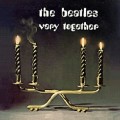

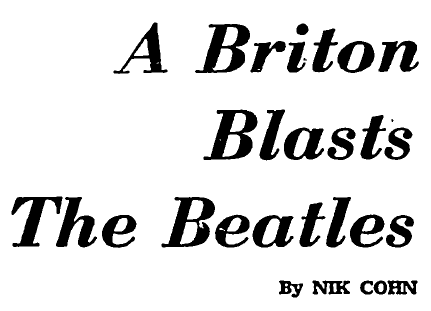

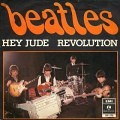

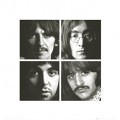
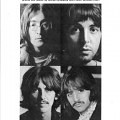
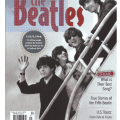
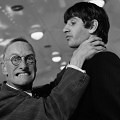
I saw he died last night.
I was a child when Manson and his followers were in the news. I read Helter Skelter in high school and was very disturbed. High school is also when I became a Beatles fan, so it was even more disturbing that Manson thought the Beatles, who were all about peace and love, were supposedly speaking to him through their lyrics.
I mean Helter Skelter was a song about an amusement park slide!
Good points Nancy, about Manson being the first to use “alternative facts.” And a precursor to the crazy times we are living in. I mean when people think that Roy Moore is a “godly” man, something is very wrong!
Weren’t the murders and the whole Manson family story one of the things that deeply upset George Harrison?
I recall reading that it was just another factor that made him realize fame was not all it was cracked up to be.
Did any of the other Beatles speak out about it at the time?
I’m glad that time has lessened the connection between Manson and the White Album. When I hear Helter Skelter, I don’t think about that. (Well I will now for awhile).
That’s such a sad chapter in The Beatles history.
It’s nice to see a new article here, even if the topic is unpleasant!
What has always interested me about Manson is where his actions left the Beatles. Ian MacDonald – who believes that the group’s work got increasingly more self-indulgent and lazy after Pepper, which he regards as their peak – lays a lot of the blame for Manson at the Fabs’ door. According to him their ever more abstract, meaningless lyrics became like Rorschach blots that anyone could project their deepest, darkest urges and fantasies onto. In other words, he sees a direct link between the relativism of random lyrical messages (“it can mean whatever you want it to mean, man”) and moral relativism, which says that all actions are equally moral or immoral. Post-truth equals post-responsibility.
When I initially read this my first thoughts were (a) that’s a bit harsh, and (b) the Beatles don’t seem to have made the same connection, because Abbey Road is filled with arguably the most nonsensical lyrics of their career. (For all we know they thought that the album’s childlike apoliticism was LESS likely to stir up trouble than songs like “Revolution” and “Piggies”.)
This raises all sorts of interesting, and deeply troubling, questions. Knowing that words have the power to create and destroy – we wouldn’t have democracy or genocide if clever people hadn’t thought up the words for them – how are artists supposed to use that power? If they polish their work until it can’t possibly offend or hurt anyone, then it’ll likely be too dull and toothless to look much like art. (Besides, if someone can read murder into “Honey Pie” then there’s no such thing as a harmless work of fiction.) But if they let their imagination run riot then they could cause all sorts of serious social problems, and people are more valuable than art.
A possible reply is: it’s impossible to predict how an artist’s work will affect social realities – after all, it was the ’60s’ archetypal “peace and love” band, and not the Stones, that inspired Manson. (This is a terrifying thought in itself.) Given the complete unpredictability of human behaviour, that means artists should feel free to say absolutely anything they like. But I think we all know that’s too easy.
As a writer who constantly overthinks the ethical content of my work, these are big questions for me. And I have to admit that I use other people’s offensive art as a kind of pressure relief valve – I would never write some of the stuff that Frank Zappa and Slim Shady came out with, much less release it, but I derive an awful lot of guilty pleasure from listening to their ids roaming free. (Interestingly, despite the fact that he turned Zappa’s “dirty” shtick up to 11, Eminem’s work is full of meditations on the borders between art and the artist, words and actions, and celebrity behaviour and fan behaviour.)
I don’t know what the answer is here, and I’ve no idea whether or not the Beatles had a responsibility to take Manson’s actions into account when writing their post-’68 work. Does anyone else have any thoughts?
Hey Justin
I have no idea who wrote the words of this post ‘Manson is dead’, to be honest I the text disturbing, still I wrote a little piece which I can save for another occasion.
I wonder is it a thing of Beatles’ fans to believe there were many ‘firsts’ because of their ‘heroes’ – the Beatles. Apart from understanding human behaviour (I recommend ‘Behave: The Biology of Humans at Our Best and Worst’ (2017) by Sapolsky) – I find no pleasure in understanding Manson, but admit I have read ‘Helter Skelter: The True Story of the Manson Murders’, by Bugliosi and Gentry, more than three times, as a story of those mad people who turn delusional and in doing that destroy lives of some or many.
I believe the influence of these people on our lives is mostly minimal. I compare this to terrorism, its destructive influence is minimal compared to deaths of traffic, alcohol, private guns, and war efforts by government, or Eisenhower said…
I’ll try to avoid the Manson hype, although it is already hot news here on the networks.
= = = =
Yet your comment hits home. Indeed is quite interesting that the songs Charles Manson picked as inspiration were not the less ambivalent more serious topic Lennon songs. Something he later expressed as being proud of, dismissing the third person nonsense he blamed McCartney for. Something nobody dared to challenge, indeed not even Ian MacDonald. Everybody was mesmerized by the hype of authenticity, something everybody believed drugs dazed Lennon was capable of, and McCartney not. I recommend ‘Truant Boy’ by Martin Shough for a better understanding of the creative authenticity of McCartney’s artistic output.
.
Oh and I think Ian MacDonald is right that late Beatles music, as much of the best western modern art, is so abstract it might function as a Rorschach blot that leaves space for a lot of our projection. However I think guilt and responsibility are different issues. There may be some correlation, but that a causal relation? I would say NO.
Rob, I wrote it. The name and photo of the author of each post appears to the left of the post’s title.
For the record, I’m not claiming that Manson was the very first to spread a conspiracy theory. I’m saying that in linking his ideas to popular culture and an us-vs-them race war he’s similar to what’s going on today.
Nancy,
I totally agree with you about Manson linking his ideas to popular culture. Who was more popular than The Beatles at the time?
I think your insights are 100% right on In reference to today.
Hi Justin!
Interesting comment. I am not a writer, only a middle aged woman from Idaho! I believe that we all have to take personal responsibility for our actions. No matter how we interpret music lyrics, books, poetry, any art form, what we do with that, is on us.
I don’t care for Marilyn Manson, his music and videos are disturbing, but if someone acted out violently in response to him, I would never blame him.
Of course the Beatles bare NO responsibility to Manson’s evil. Millions of people have listened to their music, and one crazy maniac read into the White Album, projecting his insanity unto it.
It reminds me of the stories of Led Zepplins Stairway To Heaven song. Many people have speculated the lyrics are satanic. As far as I know, no one was harmed in response to the song.
Thanks for the responses guys. I’d like to make it clear that I don’t think the Beatles deserve any of the blame for Manson’s actions – it’s pretty hard to predict that you’re going to inspire a killer by writing about funfairs and preaching peace and love. What I’m wondering is whether the bloodbath caused them to reflect on their public role at all going forward, whether it SHOULD have influenced their subsequent songwriting or not, and more broadly what an artist’s responsibilities are in general.
.
I’ll put it another way. At the moment it’s the working assumption of English, film and media studies faculties everywhere that if you insert sexist and racist assumptions into books, movies and songs then your audience is going to imbibe them subliminally. That means it’s the artist’s responsibility to examine their own prejudices, eliminate them as much as possible and write socially conscious material that sends people the right messages. If people get the wrong messages they won’t all turn into serial killers, but they’ll think worse thoughts and do worse things. Naturally, the concept of unfettered artistic expression doesn’t have many fans in the world of liberal arts degrees.
.
Much as this kind of thinking can get incredibly tiresome and judgemental, I have to admit that the killjoys have a point. What we consume does affect us, it does help shape who we are and it does influence how we behave in the world. We have a responsibility to behave well, but it’s more difficult for us to behave well if we have a bad upbringing, and the same thing goes for the media we’re exposed to (especially as kids). If you do something bad that everyone else disapproves of it’s on you, but what about the “invisible” bad habits of thought and speech that society takes for granted but are actually harmful and wrongheaded? Isn’t it art’s job to unmask these things and liberate society from them, rather than perpetuating them?
.
That’s what a liberal arts major would argue anyway. Like I say, I find it hard to go along with this line of thinking 100% because it just seems, well, boringly worthy. And that’s not something I associate with great art. It’s like Christgau says – rock music is filled with wrongheadedness and darkness, but we keep coming back to it anyway so we must be getting something useful from it.
In the New York Times, an opinion piece by Baynard Woods emphasizes the racist underpinnings of Manson’s cult:
“Mr. Manson was famously inspired by the Beatles song “Helter Skelter,” which, as he understood it, described a race war that he had been prophesying. Like many reactionaries, he saw race in America in apocalyptic terms. He believed that African-Americans would soon rise up and begin to murder white people. Mr. Manson and his followers would be spared; they were going to hide beneath the desert in Death Valley until the war was over, when they would surface from their underground layer and rule over the black population, which, Mr. Manson claimed, would be unable to govern itself.
But when this race war proved too slow in coming, Mr. Manson urged his followers to set it in motion themselves, to “do what blackie didn’t have the energy or the smarts to do — ignite Helter Skelter and bring in Charlie’s kingdom,” as Tex Watson, a member of Mr. Manson’s “family,” recalled. Mr. Manson assumed that the murders of wealthy, white Angelenos would be blamed on African-Americans and the race war would begin.”
[From “Charles Manson Was Not a Product of the Counterculture“
Nancy, I believe that the reason it took such a long time for Paul to add Helter Skelter to a tour set list was this horrific episode. I certainly understand why he would have been Über cautious about not tempting the fates. I was delighted when it finally surfaced in 2000’s. Sociopaths are difficult enough to deal with (example: Trump), but psychopaths scare the bejesus out of me, and I believe scared him (rightly so).
Prior to Manson we had endured JRK/Oswald, and in 1966 Richard Speck (Chicago nurse mass murders) and Charles Whitman (U. of Texas Clock Tower mass shootings). Then came MLK and RFK two years later. Then in 1969, we had Manson, followed by the Stones sticking a fork in the 1960’s, at Altamont.
These days, I have become numb to the seemingly endless series of psychopathic Manson-like mass shootings. They come and go with such rapidity that I cannot (and no longer even try to) keep track of them. I know I have drifted waaaay off topic here, but the direction that the human race is racing scares me for the future of all humanity.
Sorry for being a Debby Downer here (my back is out and the pain is probably warping my emotions).
Take care, stay safe and keep love in your heart. That is the only thing that will save us.
William,
You are not being a Debbie Downer. You simply stated the reality of the times.
I have been in various states of depression/anxiety since the election. I do suffer from GAD (generalized anxiety disorder) but this last year has exacerbated it.
In fact, I found this blog as result of trying to find an escape from all the news. My Beatles obsession has helped me to try and find some positivity. The Beatles music has helped me enormously this year. It reminds me there is goodness and love in the world. Which is why Manson’s fixation on the White Album is so terrible!!
Anyway, I related to your comment. Thanks!
William, that’s a good point about Paul’s taking so long to add “Helter Skelter” to his setlist again. I concur both on your sense of the reasons behind the delay and your delight that he’s done it. Reminds me of U2’s intro to their cover of “Helter Skelter” on “Rattle and Hum”: “Here’s a song Charles Manson stole from the Beatles. We’re stealing it back.”
.
Artists can’t control what people do with their work, to take up Justin’s question. It has to be horrifying to see your work used to promote a violence you want no part of. At least at this point, in 2017, we can say that the Beatles’ songs on the White Album have outlived their association with Manson’s fever dream. This past July I watched McCartney perform “Blackbird” to a capacity crowd in Tinley Park, IL while thousands of people sang along. A life-affirming moment to set beside the darkness.
And thank you Nancy. Have a wonderful and safe Turkey day! Will
@Justin, I do not think that it’s simply academic vogue or another vagary of contemporary thought that emphasizes the current responsibility of artists to at least attempt to predict the unpredictable (that is, how an audience might use their work); it is the mechanism of mass media. The Beatles could, and surely did, express all sorts of naughty things while in Hamburg, and that was fine. No harm was done, to them or anyone else, and it was clearly great for their art. The responsibility is a byproduct of scale, and proportional to it.
The Beatles in 1968 occupied an amount of mental real estate for young people that we simply cannot imagine. Manson is not a surprise — that there were not more Mansons is a surprise!
The internet, particularly social media, takes small-scale private thoughts and puts them in front of an unlimited audience. Then social media actually rewards precisely the kinds of narcissistic irresponsibility we’re talking about.
@Michael, agreed that these sorts of discussions about public responsibility are byproducts of mass media – and of course more broadly there’s been censorship as long as there’s been any form of publicly accessible art. I’m sure the cavemen had their own version of the PMRC (‘No, THAT’S not how you draw a buffalo’). But the academy has been a particularly hypersensitive breed of public watchdog since at least the days when Adorno wrote that popular music is nothing more than a form of totalitarian mind control.
.
The question of artistic responsibility fascinates me because it’s so hard to find the line between total chaos (everything’s fine, up to and including fascist propaganda) and stifling order (everything’s slightly corrupt so let’s throw the baby out with the problematic bathwater). It’s a microcosm of the freedom vs. safety debate in general. Total artistic freedom leads to bloodshed and total censorship creates an insipid conformity that’s unhealthy in its own right: we’ve got to funnel all our chaotic energies somewhere, after all. No-one with any sense is seriously arguing for either extreme, but it’s nearly impossible to determine where the middle ground lies.
The removal of gatekeepers, and the audience-driven sorting method, has made these problems pretty intractable. I hope it is temporary; it’s been catastrophic for artists and art. Imagine if The Beatles couldn’t have gotten paid, and had interacted with their audience unmediated and unformed — if they’d emerged in 1961, pre-Epstein. It’s nice to think that genius and live of craft would’ve carried them through, but then add the impossible task of making a living, and…
This is how digital media encourages people not to become Beatles, but to develop apps.
BTW, those of you who want to delve into these events and the times surrounding them are encouraged to read Ed Sanders’ book The Family.
I would NOT encourage you to delve into these events. They are, to put it mildly, a drag.
Suffice it to say: for all the Utopian ideals and concepts of the counterculture, there were smaller, less well-known groups espousing the exact reverse. Some crimes seem to connect with their era — the Whitechapel Murders of 1888; Leopold and Loeb in the early 20s; and so forth. There have always been crazoids like Manson and there have always been cults, but his story fit very snugly into the narrative promulgated by “straight society” since around 1963.
Not helped by the fact that pop is now designed by focus group-driven corporate committee, meaning that all the bottom-up subversive energy of rock ‘n’ roll’s early years has been replaced by vapidity, self-pity and navel-gazing. Maybe Adorno had a point after all…
I’m late to the party, but here is a fascinating interview with historian Jeff Melnick.
http://www.lawyersgunsmoneyblog.com/2019/08/manson-was-just-that-a-convenient-spontaneously-appearing-boogeyman-a-discussion-with-historian-jeffrey-melnick-about-his-book-charles-mansons-creepy-crawl-the-many-lives-of-americ